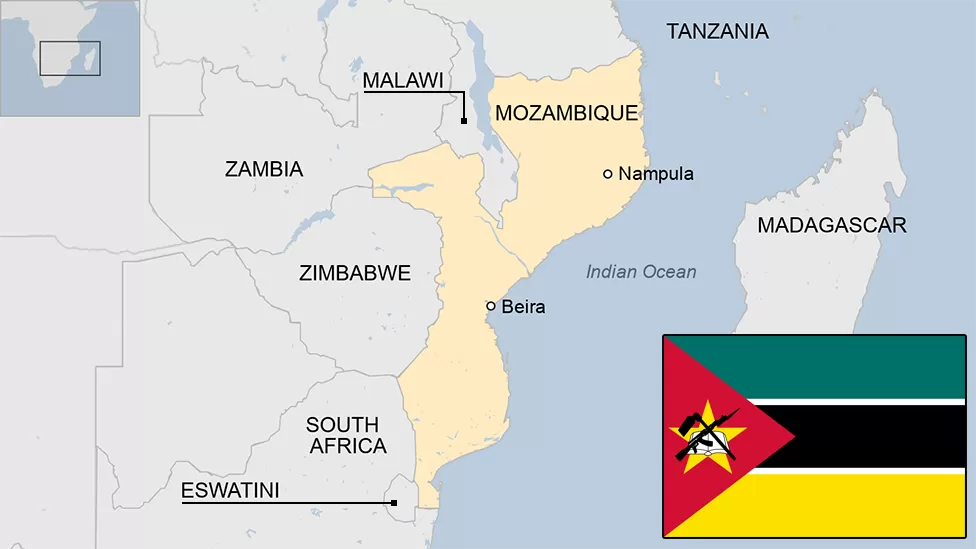Mozambique, which gained independence from Portugal in 1975, is still suffering from the effects of a 16-year civil war that ended in 1992.
Tensions remain between the ruling Frelimo party and the former rebel movement Renamo.
In the 21st Century, the economy has been growing – helped potentially by the discovery of offshore gas reserves in 2011 – but the country remains one of Africa’s poorest.
Since 2017, there has been a Islamist insurgency in Cabo Delgado province in northern Mozambique, mainly fought between militant jihadists and the security forces.
Languages: Portuguese, plus Makhuwa, Sena, Tsonga, Lomwe, Changana
Life expectancy: 58 years (men) 64 years (women)
LEADER
President: Filipe Nyusi
Filipe Nyusi, of the Frelimo party, won elections in 2015 and 2020. He has signed several agreements with the main opposition Renamo, to bring lasting perae to the country.
He presides over a country on the cusp of tapping offshore gas fields that could transform the economy. These are expected to fully come on stream around 2027-29. However, the jihadist insurgency in the north has put the state’s ability to guarantee security in doubt.
The Ilha de Mozambique is one of the country’s fastest-growing tourist destinations
Television is popular medium in Mozambique and there are around 20 stations. State-run TVM is the national network, and STV is a popular private channel.
Print media have limited influence.
Journalists who upset the authorities risk intimidation and threats and self-censorship is commonplace, says Reporters Without Borders.
Mozambique’s Portuguese influence is much in evidence in the capital Maputo
Some key dates in Mozambique’s history:
c. 400BC-400AD – Bantu-speaking peoples migrate into Mozambique, followed by waves of migration from the west and north in teh following centuries.
c. 1000 – Indian Ocean trade networks extend as far south into Mozambique, lead to the development of numerous port towns, accompanied by the spread of Islam and a Swahili culture.
1498 – Vasco da Gama’s voyage around the Cape of Good Hope marks Portuguese entry into trade, politics, and society of the region.
1500-1700 – Portuguese capture much of the coastal trade from Arab Muslims.
1698 – Arab Muslims seize Portugal’s key foothold on Mombasa Island in Kenya. Subsequently, Mazrui and Omani Arabs reclaim much of the Indian Ocean trade, forcing the Portuguese to retreat south.
19th Century – Lisbon hands over some territories in Mozambique to be ruled by chartered companies like the Mozambique Company.
1880s-1918 – Portugal increases efforts to occupy the interior of the area in the late 19th Century during the so-called “Scramble for Africa”, securing control over most of the territory, despite resistance.
1942 – The Mozambique Company relinquishes territories back to Portuguese control, unifying Mozambique under control of the Portuguese government.
1960 – Mueda massacre. Unknown number of nationalist demonstrators demanding independence in Mueda are shot dead by troops. This fuels support for those calling for independence.
1962 – Mozambique Liberation Front, or Frelimo is formed in Dar es Salaam, Tanzania.
1964-74 – Mozambican war of independence. Armed fighting breaks out as a result of of frustration among many Mozambicans who see foreign rule as exploitative.
UN pressures Portugal to decolonise. Portugal threatens to withdraw from Nato, halting pressure from within Nato to quit its African colonies. Nationalist groups in Mozambique turn to the Soviet bloc for aid.
1974 – Following the Carnation Revolution in Lisbon, the new Portuguese government calls for a ceasefire and talks culminating in the Lusaka Accord, handing over power to Frelimo.
1975 – Independence: Frelimo sets up single-party system, leading to civil war.
1977-92 – Mozambican civil war between Frelimo government, with support from Cuba and USSR, and anti-communist Mozambican National Resistance (Renamo) rebels, combined with sabotage from the neighbouring states of Rhodesia and South Africa. Over a million people die in the fighting and subsequent famines.
1990 – Constitution amended to allow multi-party system.
1992 – UN-brokered peace deal ends fighting between Frelimo and the Renamo rebels.
1994 – First multi-party elections.
2017 – A jihadist insurgency begins in the north, delaying the development of promising offshore gas fields.
